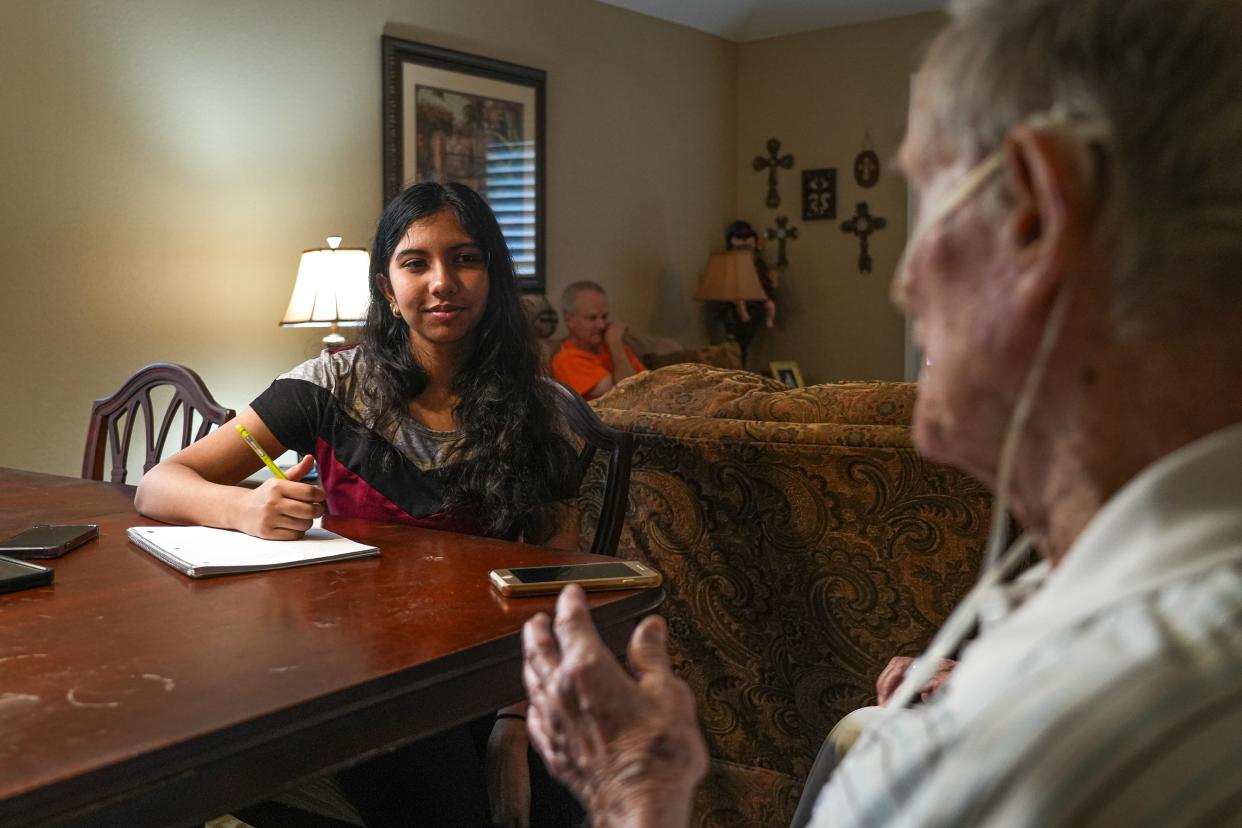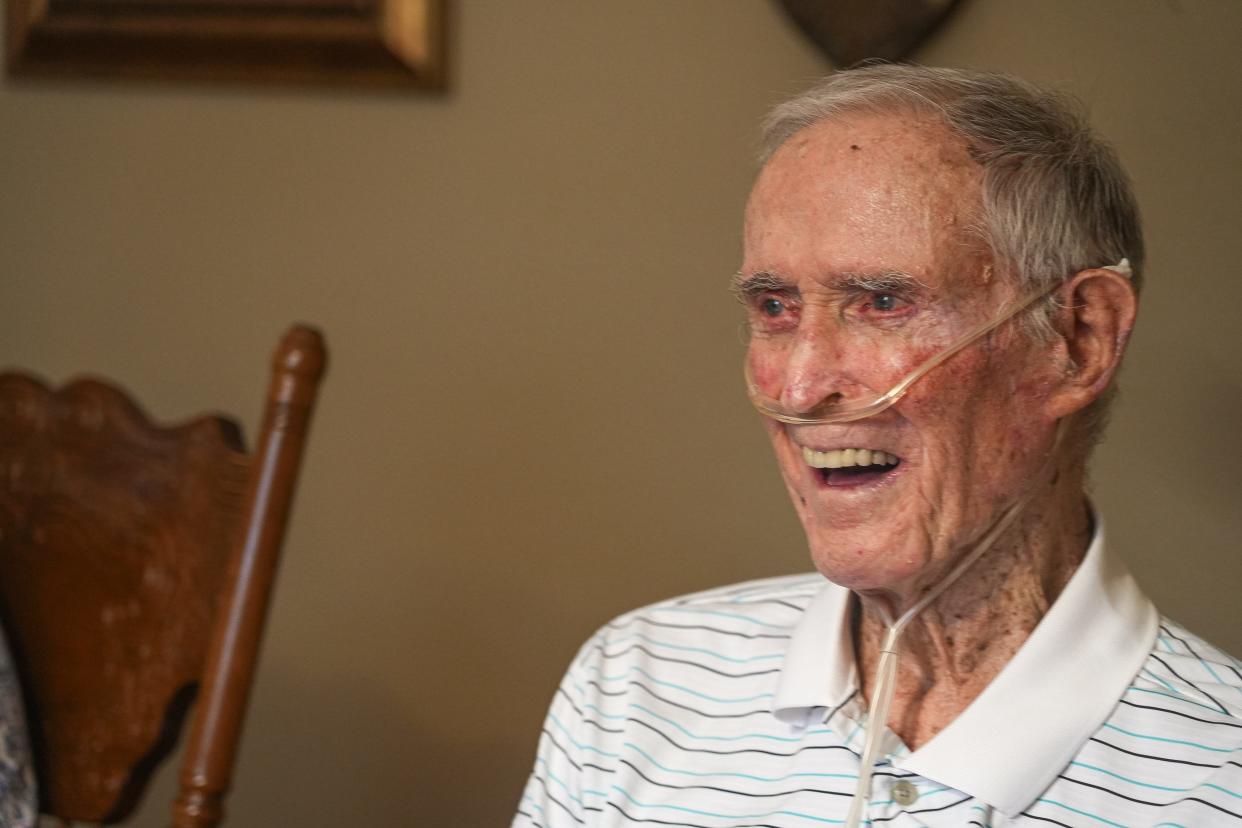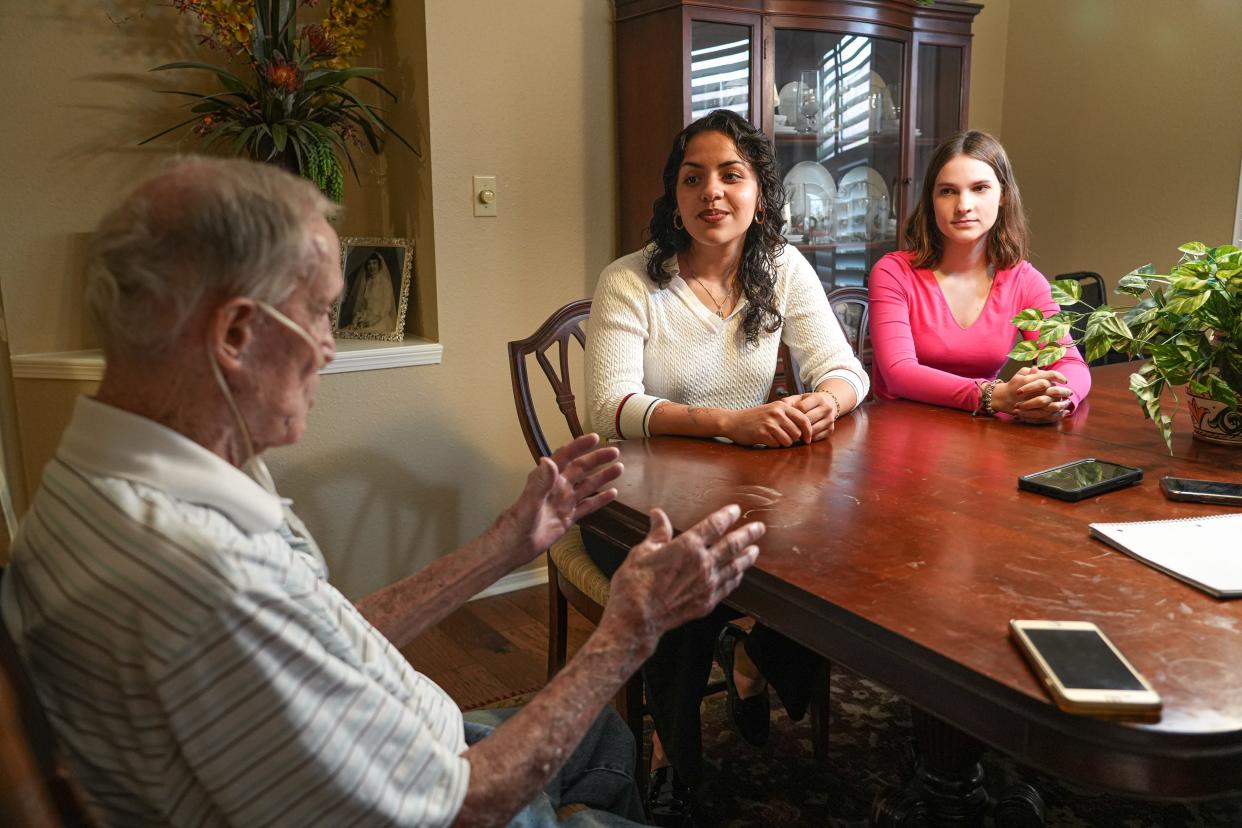University of Texas club puts life's memories into book for people receiving hospice care
"What would you like your legacy to be?" Galilea Dupree asks Bob Bell, as she and two other University of Texas students gather around the dining room in Bell's North Austin home.
"I want them to remember I was cute and I sang a lot," Bell says.
"You danced a lot," adds his wife, Betty Bell.
Bob and Betty Bell then go into stories of Bob's life: how he danced in high school as well as played football, basketball and tennis. How his high school girlfriend didn't stay loyal to him when he was drafted into the Korean War. How he met Betty when she was in a car with some girls he knew. How they raised their five children — two boys and three girls — born within six years.
"We didn't hesitate," Bob said. "I was the happiest man in the world with five kids."
Bob, 92, has congestive heart failure. After three strokes and two heart attacks, he began receiving services with Hospice Austin in November. He is one of nine people in hospice who are having their stories told by UT students as part of the Last Writers club.

The club works with Hospice Austin and Compassus hospice to identify people who would like to have their stories told.
The students form teams, and each team is matched to a person in hospice care. The teams then spend the semester interviewing the person and the family. Then they write a book about the person and include photos. The book is published by Barnes & Noble's self-publishing service. Family members can then order the finished book.
Bringing Last Writers to Austin
Last Writers was started in 2020 at UT-Dallas by then-student Yilong Peng, who is now in medical school. At UT-Dallas, Last Writers was set up as a class that then-freshman Sonya Swami took in 2021. Swami remembers the 76-year-old woman with whom she was matched. The woman had been diagnosed with multiple sclerosis in her 40s.
"I took a lot from her story," Swami said. "Every step along the way was about perseverance."
Swami, who is from Austin and is now a senior at UT-Austin, also took a lot from her family's life. When she was in fifth grade, her father went home to India for four months to take care of her grandfather, who had Parkinson's disease.
"That shaped the interest I have in hospice care," Swami said.
She is planning to take a gap year and then enter medical school. Last Writers became a good way for her to explore end-of-life care before medical school.
When Swami transferred to UT-Austin as a sophomore, she wanted to set up Last Writers but had difficulty getting it done as a class. Instead, it's become a club, with 22 people who applied to be part of it and Swami leading it.
Many of the students are planning a career in medical care. Dupree is a junior in nursing. Her partners Neelanjana Chakrabarty and Paula Somoza are freshmen in biology and biochemistry.
This is the club's first semester at UT, but it used the guidebook set up by Peng. The club also consults academic adviser Dr. Tyler Jorgensen, a Dell Medical School assistant professor in palliative medicine who works at Dell Seton Medical Center and Ascension Seton Medical Center.

The power of telling stories
Jorgensen has had an interest in storytelling as a doctor, first in the emergency room and now in palliative care.
"I find that story is what shows us who the human we're providing care for really is," he said. "This is not a patient. First and foremost this is the person who has lived a life. The story is their legacy. That's what goes forward; that's what the family will tell."
Before the students meet with their participant, they go through the Last Writers guidebook. Hospice Austin held some trainings to teach students about what to expect from someone who is receiving hospice care. Jorgensen also provided his guidance.
"What I have enjoyed doing is really affirming that what they are doing is incredibly valuable," Jorgensen said. "This is really a unique opportunity and a privilege."
Of the nine people whose stories are being told by the UT students this semester, two already have died. Those teams of students will continue to write the story based on interviews with family and friends.
For Betty Bell, the writing of Bob's story "means a lot," she said. Their family, including their children, "are so excited," she said.
"Me especially," Bob said.
"We're very excited to produce it," Chakrabarty said.
This project is one in which everybody wins, Jorgensen said. It's a benefit to the hospice agency because it has something it can offer the patients. It's a benefit to the family and patient because they will have this memoir. For the students, "this is an opportunity to walk alongside a person for months," he said. "You see them change over time. You learn about nearing the end of life and valuing patients for the people they are."
"Everybody is winning," Jorgensen said. "Everybody is doing it with good motives."

Getting to know Bob Bell
Dupree, Chakrabarty and Somoza have been spending Sunday mornings with Bob Bell and his family. They have listened to some recordings Bob made of the music he wrote. At one point, he went to Nashville, Tenn., to pitch his songs to a music producer.
He remembers being told, "Your music is slow and boring."
"That's when we got up and left," he says. "I was mad. I was ready to punch him out."
They've also learned that while Bob "can do anything he puts his mind to, and 90% of the time he can do it better than anyone else," as he says a friend once said of him, he is not a good handyman.
Betty tells of the time he was supposed to fix the garbage disposal and she found he had used a pencil jammed in the pipe to fix the leak, and the time he got the clothes dryer door to shut by using the ironing board and two cartons of Cokes against the door.
"I didn't have the proper tools," he says.
"That's right, Mr. Plumber," Betty quips.
Bob always has been good with the kids, Betty says, from their children, to their nieces and nephews, to the neighborhood kids.
Every night, the children would wait for him to come home, Betty says. "And the neighborhood kids, too. They would be sitting by the front door with their ball gloves to play with Bob."
"When I pulled up in the driveway, they were all there," Bob says.
"And that's about all I can tell you," Bob says. And then he launches into another story, often prompted by his wife's answer to the students' questions.
What the students have learned from Bob Bell
The students were drawn to this club because they wanted a deeper connection with the type of person they might have as a future patient.
In her nursing classes, Dupree said, "it's completely patient care, pathophysiology, what's wrong with the body and how can we fix it. ... I was really craving some kind of experience that would allow me to connect on a much deeper level and dig deeper behind all of that."
The Bells share the secret of their long marriage — 70 years. "I just keep my mouth shut and let her talk," Bob jokes.
Betty says that's not the secret. This is: A priest advised them when they were getting married not to let the little things build up. Instead, every few weeks, they write each other a letter about what's bothering them.
It's a practice they brought to their children. The kids could write a letter about what their parents or siblings were doing that annoyed them. The one rule was they couldn't cuss.
Then they would air their grievances.
"We'd always end up with everyone laughing," Betty says.
Humor always has played a part: "Bob treated everything with a sense of humor," Betty says.
Bob advises the students: "Smile a lot." And he adds: "I like to tell jokes. I'm not that funny."
The students consider it a privilege to sit with Bob. "I'm just so grateful that I get to even share this time with you, Bob, and thank you so much for just making these experiences so enriching for us," Dupree tells him.
Where they are in their lives, Dupree says, "there's a lot of choices we'll be making soon. I'm sure we're all really in need of advice in living really full, rich lives," she tells Bob, "and I think you've lived a very beautiful one."
This article originally appeared on Austin American-Statesman: University of Texas club writes biographies of people in hospice care
